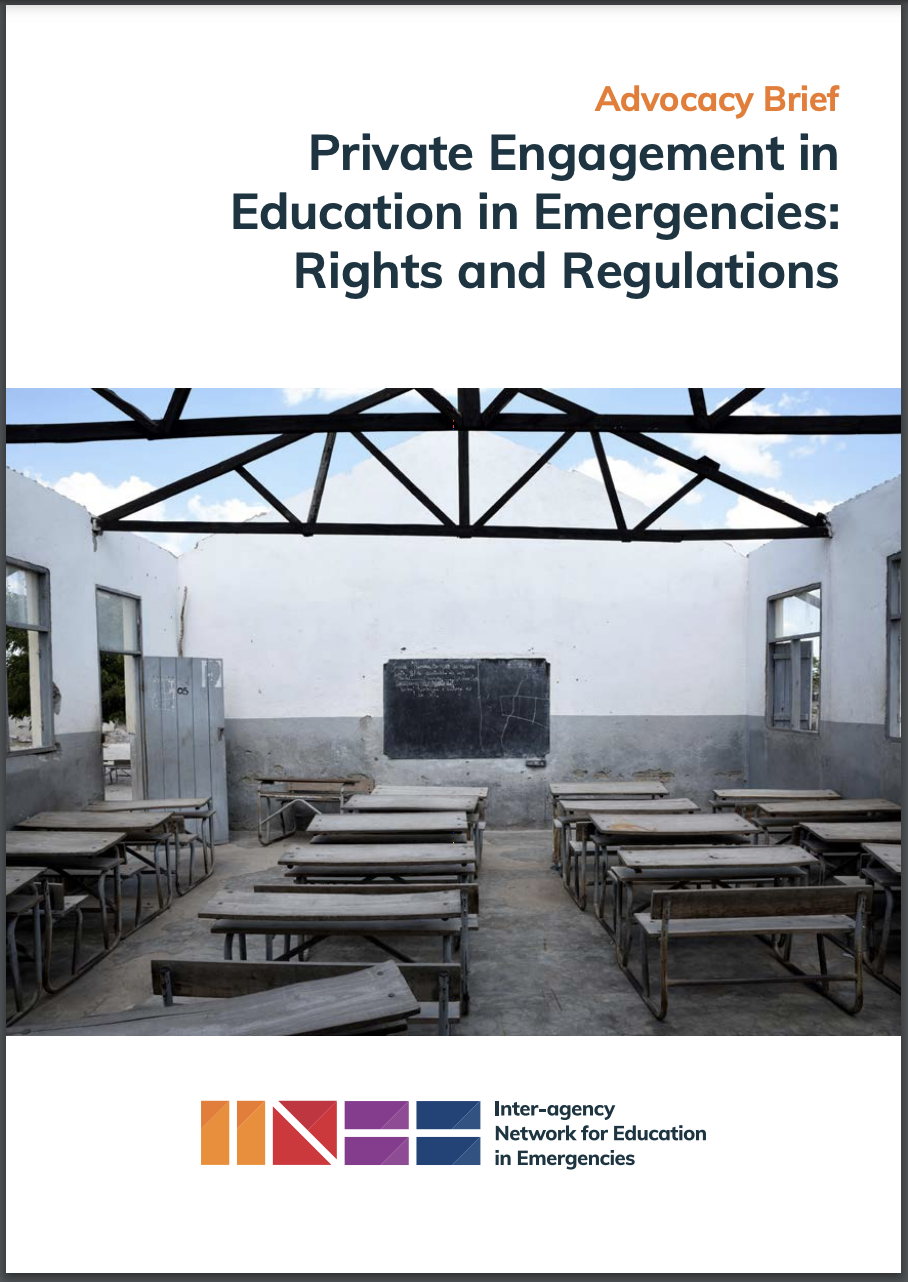Private Engagement in Education in Emergencies: Rights and Regulations
Efforts toward achieving Sustainable Development Goal 4 (SDG4) have prompted calls for greater engagement by the private sector, asserting that businesses and foundations can play significant roles as partners in education in emergencies (EiE). In turn, private actors have become increasingly involved in various aspects of EiE programming, resulting in tensions associated with the specific roles and activities of for-profit actors in humanitarian intervention.
As the world continues to grapple with the impact of COVID-19 on education, the private sector has taken on a notable role in enabling virtual learning and supplying educational technology in the context of wide scale school closures. This critical moment highlights the need for a clearer understanding of issues and strategic debates associated with the engagement of for-profit actors in education in times of crisis, and ways of addressing tensions that may arise from this engagement.
 In the new INEE Advocacy Brief, Private Engagement in Education in Emergencies: Rights and Regulations, we explore some of the tensions arising from the unique involvement of for-profit actors in EiE, and make recommendations to support the prioritization of safe, equitable, and quality public education for all children and young people affected by crises.
In the new INEE Advocacy Brief, Private Engagement in Education in Emergencies: Rights and Regulations, we explore some of the tensions arising from the unique involvement of for-profit actors in EiE, and make recommendations to support the prioritization of safe, equitable, and quality public education for all children and young people affected by crises.
Key principles, deriving from legal standards, establish the role of the State in protecting the right to education, and as the primary duty-bearer for the provision of education, including in emergencies. These include global conventions on the rights of the child and refugees, as well as international humanitarian law; rights-based development frameworks such as SDG4; and guiding principles on education in emergency contexts, such as the INEE Minimum Standards. Further, the Abidjan Principles outline the human rights obligations of governments to both provide public education to all within their jurisdiction while also upholding regulatory frameworks for private engagement.
While the Abidjan Principles clarify the human rights obligations of governments to provide public education and regulate private actors’ involvement in education more generally, guidance on the role of private actors in crisis situations is less clear. This brief addresses this unique intersection by aligning the Abidjan principles with the INEE Minimum Standards.
Analyzing the various roles and issues arising from the engagement of for-profit actors in EiE, we identify and unpack tensions related to: private funding for EiE; the need for flexibility and speed in response; private-sector supported technology and innovation; school provision through public-private partnerships and low-cost private schools; and private sector involvement in policymaking and advocacy.
We advocate for the broader right to education and achievement of SDG4 by outlining seven key recommendations to governments, donors, and non-governmental actors for ensuring effective private sector participation in EiE.
Key recommendations for private sector participation in EiE:
- Prioritize the “do no harm” principle of humanitarianism. All private sector activities in EiE must adhere to the “do no harm” principle and ensure the educational rights of affected populations.
- Prioritize the participation of affected communities. Without active community input, business-supported interventions risk decontextualized design and implementation that are misaligned with local interests and knowledge systems, leading to poor educational results and potentially discriminatory practices that produce, sustain, or exacerbate conflict.
- Support the long-term sustainability of public education. Effective private sector involvement in EiE requires a sustained and ongoing commitment to public education.
- Regulate private sector activities. Private actors involved in education in emergencies must be regulated by the State and held to the same accountability principles as other non-governmental actors and state agencies/entities, in line with legally binding international human rights standards to ensure quality, equity, and access, especially with regard to learners and families affected by crisis.
- Promote transparency in profit-seeking activities. Transparency regarding conditions of funding and profit-seeking activities, such as creating new markets for products, brand association and product testing, may help to identify conflicts of interest that counter the “do no harm” principle.
- Ensure that private funding to EiE is transparent, equitable, and coordinated. When locally available financial, material, and human resources cannot meet education needs, engagement with private actors may be an option, and in some cases even a necessity. However, private financing should not undermine national and local ownership of education programs. Moreover, sustained, predictable funding is needed to make an impact on EiE, whereby emergency private financing is harmonized with longer-term funding arrangements and exit strategies.
- Develop specific guidance on private participation in EiE. Given the unique tensions arising from private participation in EiE, an addendum to the Abidjan Principles that directly addresses this issue would help clarify expectations for government responses.
The views expressed in this blog are the authors’ own.
Francine Menashy is Associate Professor in the Department of Leadership in Education at the University of Massachusetts Boston.
Zeena Zakharia is Assistant Professor of International Education Policy at the University of Maryland, College Park.



